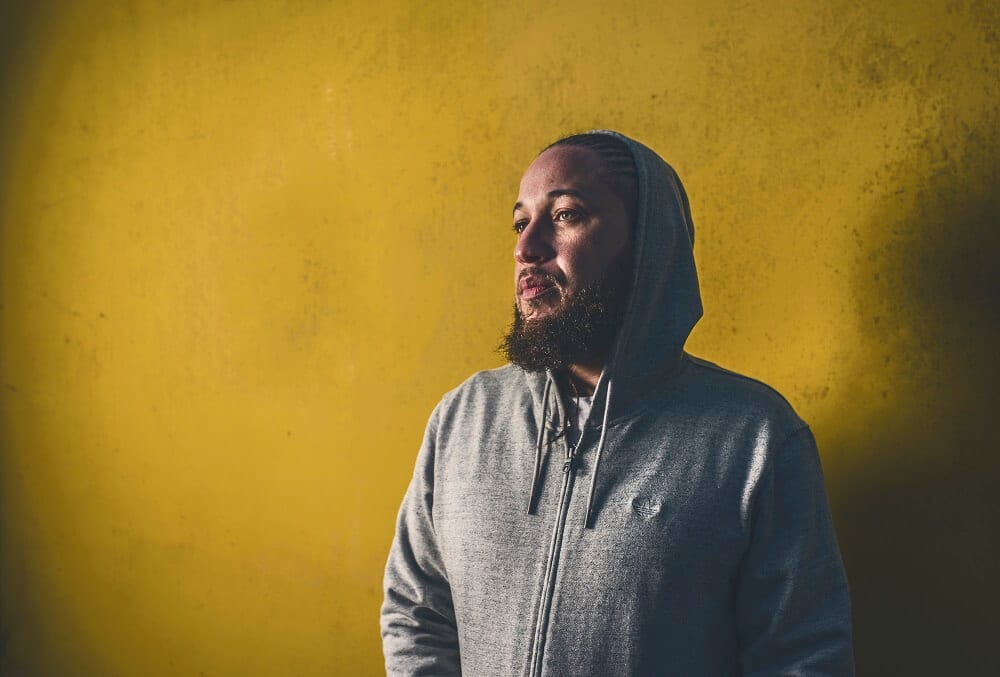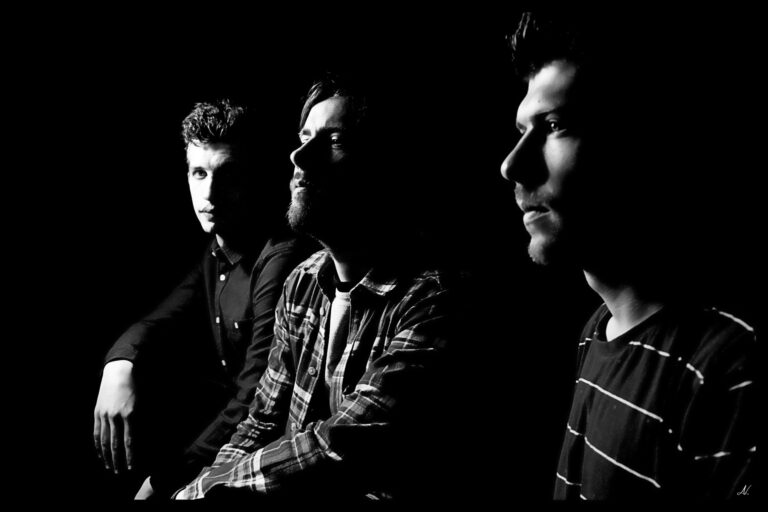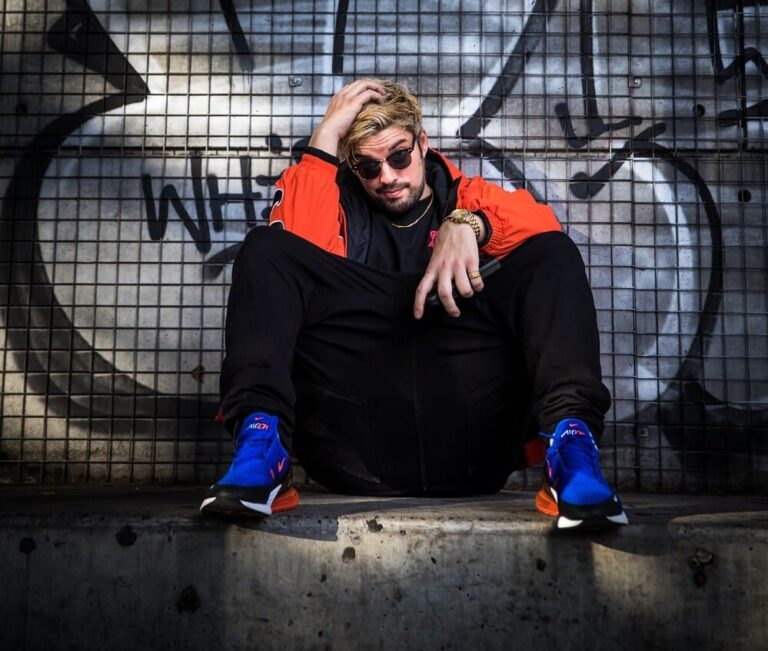There’s an elite line of MC where their dexterousness is part of the tight fabric of their signature. MCs who can jump on beats as disparate as lovers rock and drum & bass and know what to do, what to say and how to say it. MCs like Rider Shafique.
Armed with a natural style, command and ability to switch between powerful spoken word or gully dancehall style, you’re just as likely to find the Gloucester-based MC on Critical or Metalheadz as you are Deep Medi, ZamZamSounds or Cosmic Bridge.
Most recently spotted articulating the crucial message on Swindle’s beautiful new album No More Normal – but sounding just as crisp on a Sam Binga rump-shaker, a DJ Madd system-breaker or a Khan earth-quaker – Rider has been flexing across the soundsystem continuum since his breakthrough in the early 2000s as a member of the Pressure Drop Soundsystem, levelling up in every way each year; lyrically, stylistically and consciously as he broadcasts a consistent flow of positive, progressive and thoughtful messages in his work.
Currently working on a massive anti-gun track with Pinch, Monkey Marc and Ninjaman, his first solo EP and a photography project called Loc’s (to name just a few of his many creative missions right now) we caught a moment of Rider’s time to find out more about the man behind the deep dexterous bars…
Biggup on your role on the new Swindle album
Thank you. It took a long time, but the final project with all the artists involved was really nice and a pleasure to be part of.
How long did it take?
I can’t remember when he approached me but it was a while ago. We were doing a gig in somewhere like Belgium. I was MCing for a mutual friend and he was there playing too. He mentioned about doing something together and having an idea for the album. He explained the concept he wanted to achieve. We share the same ethos and similar ideas so I was up for it straight away. Then he played me the P Money and D Double track and told me he envisioned me doing the opening and closing parts of the album. We did it in Red Bull Studios. He gathered the tracks together and, a while later, called me up to do the outro.
I love that consistency of the message at the start and the end. The message is the most important thing. For me it’s about removing the ego and thinking of the wider picture.
Yes. There are more similarities between us than there are differences. Let’s work on that other than being divided by silly little things.
Messages like this are more important than ever and MCs are in an ideal position to convey that. Are you noticing more consciousness in MC culture these days?
Yeah I think so. Hopefully. I believe there has to be a balance. I grew up listening to dancehall in the 80s and their main topics were the three Gs; guns, girls, ganja. But we also had the conscious side with reggae. The same with hip hop; you had more aggressive groups and the more conscious crews with deeper lyrics. I listened to dancehall and reggae mainly, but I found with hip hop you can say a lot more than you can in a dancehall track. So that’s why I gravitated more towards that style.
When did you start writing?
Young. Very early times. Music’s always been in my family. When there’s not much money you got to be creative and do things that don’t cost. Rapping is a very affordable pastime so me and my brothers would listen to Dad’s records, get tapes and mixtapes and 45s and mess about MCing, rhyming and toasting on the instrumentals. That’s how it started…
I first came across you from the Black Canvas album. That was on Tayo’s label Cool & Deadly so I’m guessing that’s how you know Sam Binga from his days as Baobinga?
Yeah, through those channels. He worked a lot with a guy called ID. ID asked me to do a spoken word track over a track called The Light. I think it was one of my first spoken word things. So yeah I knew Sam from around that time. 2010/11 I think.
I thought it would be earlier than that. Black Canvas was 2009 wasn’t it?
It was made a little while before it came out. So Black Canvas was with Justin who was one half of Pressure Drop. We were doing stuff as Pressure Drop Soundsystem all around Europe, Germany, Austria and around there. He had a label called One Eye. That’s where the first Rider single came
Pressure Drop was early doors for you. I think you joined as a teenager.
Yeah I was young. It was a good way to get into this. It wasn’t what I envisioned doing before I came into it. It wasn’t straight hip hop or dancehall or straight drum & bass, it was a mixture of different sounds and instrumentation. I had to be open to different ideas and styles. I wasn’t a straight MC, I had to mix my styles to complement the different styles being played. It was good to have Martin alongside me, he had a lot f experience and it’s always nice to have another MC on stage with you. You can bounce off each other and have more fun. But it was an interesting experience because I arrived in the collective at an unusual time. CDs were looking like they were going out. Vinyl wasn’t doing well. We couldn’t foresee how the industry would develop. It was very confused at the time. But I had fun and learnt a lot along the way.
You mentioned the versatility just now. You must get a lot of request from every genre?
I’m blessed. I’m glad to be getting more roots and steppers stuff at the moment and I have a lover’s rock thing to work on, which is really nice. Obviously there’s a lot dubstep. A lot of spoken word stuff. And people leave it down to my interpretation.
I wondered if you’ve ever been directed lyrically or left to your own creative devices. Has anyone ever suggested a tone or subject matter? Or asked to keep politics out or anything?
Ha, not really. Sam Binga requests slackness and girls tunes and I’m up for that. I’ve said in other interviews; I’m not serious or political all the time. It’s the balance. Sometimes you want joke, sometimes you want to talk about girls, sometimes you want to talk about something else. Different rhymes for different times.
I read that. You said it reflects the melting pot of the music
Yeah not every day you want to watch a documentary, other days you want to watch a comedy. It’s all part of me. But I do ask artists what kinda thing they want. Some ask for more of a spoken word approach, others want more of a dancehall style.
Or more of a cosmic dancehall/hip hop hybrid style like the recent Preacha track on Nice Up. How did that come about?
Most of these releases are with people I bump into on the road or meet performing live. I met Preacha, in New York. He did stuff with Dub-Stuy under a different name. The sound in New York is great right now. It’s a blend of hip hop and reggae which was something I grew up listening to in the 90s with guys like Born Jamericans, Mad Lion, even guys like KRS One and Busta Rhymes had very strong dancehall roots. That was a very big sound for me, so I’m really into how Dub-Stuy are bringing back a lot of those real reggae sounds and linking up Jamaican artists. My last release with them I voiced the same riddim as Burro Banton. That was a moment. These people who I look up to for inspiration are on the same riddim or version or vinyl as me? That’s really nice.
What else is coming?
Lots. Anther big thing I’ve worked on is with a producer called Monkey Marc. It’s a collaboration with him and Pinch which I’m on and so is Ninjaman. It’s becoming this huge track now with other MCs and Jamaican can artists on there. It’s Ninajman’s message about leaving the guns alone because he’s in prison for murder so there’s a lot of MCs talking about anti gun violence. There’s a huge video with lots of the dancehall squads out there. It’s a big project and it’s real nice to be part of.
That’s massive
Yeah it’s quite humbling to be part of. I’ve also started my solo record with Sam Binga which will be more stripped back and more like a spoken word project. Not so beat led, more percussive and acoustic. I got features for days to be honest. I’ve been putting the work this last year!
It must be nice when a feature comes back as a release. These things take time don’t they?
Yeah man they do. But what is nicer is that you meet these people on the road and they connect with you and your point of view and they reach out and get you to the studio and want to work with you. It’s the nicest feeling when connections are made like that.
Absolutely. Beyond the music you also have a photography project called Loc’s, right?
Yeah, it stemmed from my spoken word piece Identity which originally came from 45 minute play I was commissioned to write. Through that I was inspired to create images and art that represented things I didn’t have growing up. Lots of things influence me like films, comic books, graphic novels, literature, photography, art… But it all came from a different perspective. There wouldn’t be any mixed character who had origins I could identify with in a video game, for instance.
So the project is me addressing that and creating those things. It actually came about in this way because I lost two of my aunties in 2015 and I didn’t have anything to celebrate them. There were pictures, but nothing to celebrate their lives. They both had locs at different times in their lives so I created this photography project for people who identify as black and have had their hair in locs for whatever reason. My one auntie was a Rastafarian so she had her locs for religious reasons. My other auntie wasn’t a Rastafarian but had locs through self love and learning to love herself. It’s partly artistic but it’s partly educational. People call them dreadlocks but dread was a name from the Europe to connote dread, fear, unkempt people…
Wow. Excuse my ignorance. These phrases are so normalised you have no idea about their history
I think so. I’m not saying I’m right or wrong, but people need to know that history of the term and make up their own minds about if it’s right to be celebrated. So yeah I’ve started projects like that and through music I meet a lot of people who make videos and photographers and all kinds of things and together we can create things from my perspective and their perspective. Learn to love ourselves and each other regardless where we come from and let’s make things more interesting. This goes back to your earlier question about consciousness in MC culture. It’s all about learning and education. If you know better, you do better. It’s about addressing issues in our community; go back to the root of something and it makes sense. Then and you can deal with the problems.
You must get some really interesting interactions from fans because you work on this level?
I get some very nice messages, sure. Some of the spoken word stuff has touched people more than I imagined it would. Sometimes you don’t value your own voice, it’s just what you do. But then someone takes the time to tell you it has moved them and you step back and consider that. It’s nice man, I appreciate it.
Appreciate Rider Shafique: Facebook / Soundcloud / Twitter


